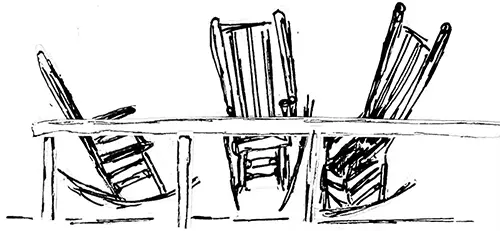The Nightstand 453
Paterson and Poetic Fidelity
Creative fidelity is attuned to, and draws out, the richness in people and things. It calls for awareness and attentive seeing. In the end, Paterson is a film about such…
The Joyful Christian Nationalist: How Stephen Leacock Loved His Home by Resisting the World
Undergirding Leacock's work was not a desire to restore a previous version of Canada, but to preserve the gifts God had given: the best traditions of the past, the communities…
Stories of Healing and Wholeness: An Appreciative Engagement with Wendell Berry’s The Need to be Whole
Brecon, Wales. Stories are a necessary part of healing and wholeness. I don’t just mean a story we may like or we tell ourselves (though they include that), nor do…
An American Augustine
The various parts—historical and autobiographical, theological and literary—all contribute to the central thread: that we seek wholeness, and that wholeness depends on better understanding ourselves and our damaged, but not…
More of the Familiar in Wendell Berry’s How It Went
He has never chased the new or tried to be avant-garde. Even in the physical act of writing, he has famously resisted the “advantages” of a personal computer and has…
Remembering Revisited
That integration, that coherence of self in two souls resurrected in each other’s presence, is what keeps my place in my community. It’s what makes a home for my grievances,…
The Leavening Effect of Seeking the Truth: A Review of Untrustworthy
In Untrustworthy, Kristian sets an objective for Christians to be faithful, factual, and fair. In some cases, this must be practiced in a somewhat extreme environment. What do we do…
Stumbling toward Vulnerable Interdependence: A Review of The Ink Black Heart
Not only is this a literary accomplishment, it’s an example that both Rowling and her critics – and, by extension, all of us who wish to live in compassionate community…
Along the Garden Path of my Fathers
They know their neighbors; they know their village; they know their land. They have their own vernacular that everyone who lives there understands because their father and mother taught them,…
A Pathway to Peace: Hope in The Need to Be Whole
Berry, with an insistence that defies despair, is still carrying out his calling. He notes the discouraging odds his kind has faced not just now but in the past. Imperial…
Identity and Integration: A Whole Lot of Wendell Berry
Berry connects these major themes from The Hidden Wound to other themes from his many works—work, agrarianism, industrialization, citizenship, affection, and place. In so doing, he offers his readers a…
Seeking Clarity: Wendell Berry’s New Book on Race
These are not compassionate times—not in the public square, and not in all too much of our increasingly chaotic private life, though I think many people are trying. Mr. Berry…
Practicing Authentic Conversation
If I attempt to follow Berry’s underwater route too closely, I’m afraid I will drown. Rather than try to summarize it, then, I will instead distill from it a set…
Patriotic Work: Wendell Berry’s The Need to be Whole: Patriotism and the History of Prejudice
No one can be whole alone; no one can be free alone. Rather, Berry holds that “[t]o be whole and free is…to be at home in a place and in…
Walking alongside Wisdom: A review of Learning the Good Life
Lying on a bed at 2:00 AM idly flipping through a book while texting a friend isn’t likely to be a transformative experience. Treating education as a hoop to jump…
Flowers and Dust: Summer in The Great Gatsby
The summer, its heat and its flowers, has finally been put to death. But the dust remains. George Wilson is covered in it, alive and dead, and as Nick told…
Perspectives of History: Philip K. Dick’s The Man in the High Castle
Turmoil is present throughout Dick’s world, and this is clearly reflected in each of the three characters discussed here. Tagomi, Wegner, and Childan’s lives are greatly influenced by events precipitated…
The Scholarly Lewis: A Review of The Medieval Mind of C.S. Lewis
Baxter articulates two central features of the Medieval Model: the ordered and iconic nature of reality. Reality is not a chaos waiting for us to impose structure on it or…
What in the World is the World?
Perhaps it’s the nudge you need to reconsider your little actions and the grand narrative which guides and orients them. And, perhaps, you’ll go out to confront the real in…
Agrarian Theology and its Limits: A Review of Agrarian Spirit
I am not faulting Wirzba for failing to include these examples of more conservative Christians who practice agrarianism. But I would ask whether his theology of agrarianism, written in an…
Defining Race: A Review of Classified: The Untold Story of Racial Classification in America
In their newest incarnation, American racial preferences are advertised to the public as compensating for prior pro-white discrimination and promoting racial diversity. Problems of definition persist under the new order…
The Only Bonds to Be Found: A Review of The Most Beautiful Place on Earth
An imagination like his, fictions like his – born from affection – may not provide us with data or answers but may help us feel “somehow more substantial and less…
Hunting, Hearing Loss, and Environmental Ethics: A Review of A Catechism of Nature
Brown stresses the need to pay attention to “what God has said, and nature is his most primordial and exoteric word”; after all, within this word, human nature is situated…
Restoring Ideas and Structures: A Review of The Right to Repair
For readers exhausted by the seemingly intractable erosion of society by powerful forces, Perzanowski, has, thankfully, included many tales of heroic and insurgent successes sure to inspire readers, and his…






















